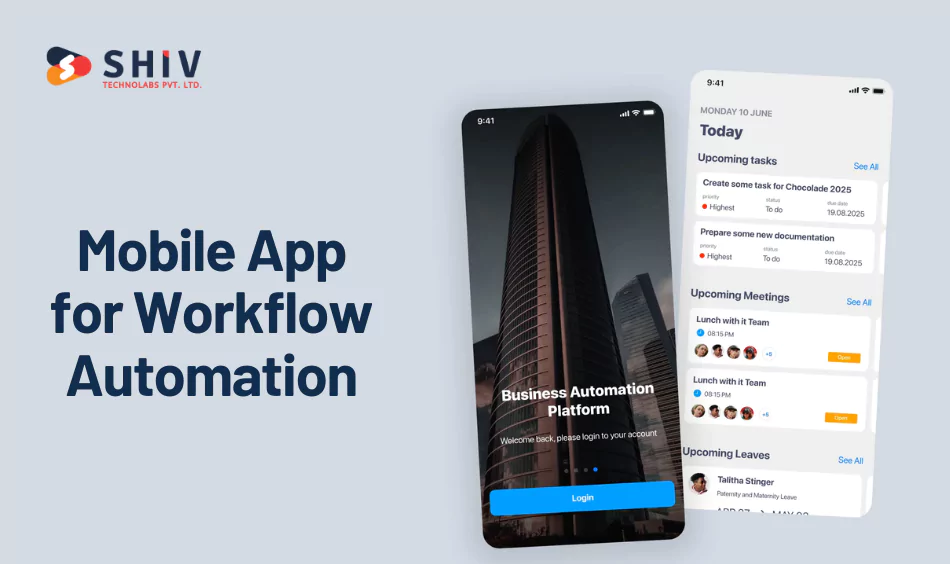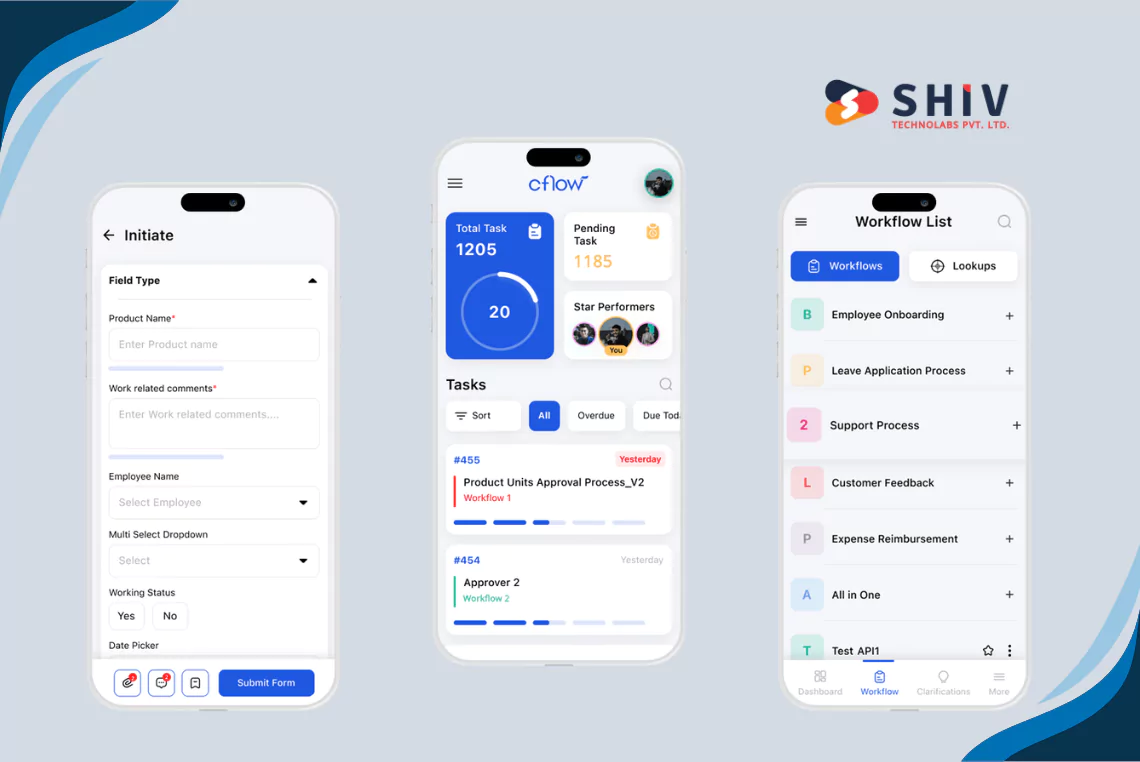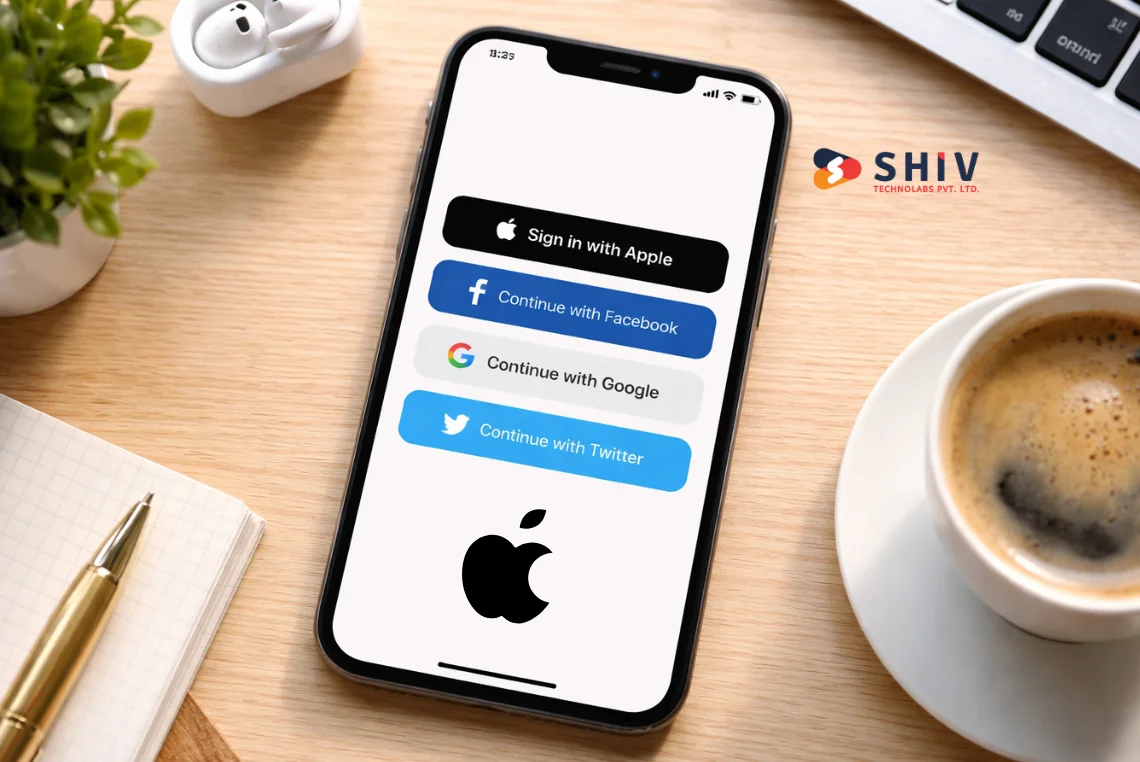Table of Contents
Growing companies face a common challenge: workers often spend too much time on mundane, repetitive tasks, rather than focusing on strategic plans and business expansion. A report indicates that approximately 60% of jobs today could utilize tech to perform at least one-third of their tasks. This suggests that many companies are wasting money and time on tasks that technology could handle more effectively.
Custom mobile app development services solve this problem. Companies can stop using outdated spreadsheets, lengthy email chains, or malfunctioning computer systems. They can build phone apps tailored to their business needs.
These apps handle tasks like getting approvals or making reports without human help. A mobile app for business process automation eliminates errors, saves work hours, and enables workers to perform better jobs. Both small and big businesses need this change to stay ahead of their competition.
Why Manual Work Is Holding Businesses Back
Small teams can handle manual work without too many problems. But when companies get bigger, these old ways start causing trouble. Workers make more mistakes, miss important dates, and teams fail to communicate effectively. These problems cost money, waste what the company has, and make both workers and customers angry.
Common Problems Caused by Manual Processes
- Workers type wrong information into computers
- Bosses take too long to say yes or no to requests
- Different parts of the company do not talk to each other well
| Factor | Manual Processes | Automated Processes |
|---|---|---|
| Efficiency | Slow, dependent on individuals | Fast, consistent, and trackable |
| Cost | High labor and correction costs | Lower operational costs in the long run |
| Accuracy | Prone to human error | High precision with reduced mistakes |
What Is a Mobile App for Business Process Automation?

A mobile app for business process automation is a phone program built specially to replace boring, repeated work with smart computer workflows. Workers no longer need to type information by hand or chase after approvals. The app does this work by following rules and automatic triggers.
Put simply, this means manual work automation through apps. Here are some examples:
- Workers clock in and out using an app instead of paper time sheets
- Expense reports get approved automatically through app workflows
- Managers get instant reports without waiting for weekly updates
When companies eliminate redundant tasks, they achieve faster results, fewer mistakes, and happier workers.
Key Benefits of Using a Custom Mobile App for Workflow Automation
Creating a custom mobile application to automate business processes has an array of advantages that extend far beyond time savings.
Reduced Operational Costs
Manual work requires the presence of people, and people do cost. With the automation of boring tasks, companies save a lot on the costs of workers. They also end up spending less money on correcting mistakes or redoing work.
Real-Time Data Access and Accuracy
Automated applications convey data immediately among teams as well as the computer system. This assists bosses in making better decisions, keeps the information accurate, and prevents duplication of work by teams.
Faster Decision-Making and Approval Cycles
Slow approvals stop work from getting done. An app-based workflow delivers messages immediately, allowing managers to make decisions yes or no in real time, anywhere, including when they are not in the office.
Must-Have Features in App-Based Automation for Businesses
All apps make work truly easier. To get the most value, app-based automation for businesses needs these features:
- Workflow management dashboard for real-time visibility
- Job scheduling and monitoring to eliminate deadlines
- ERP or CRM system integration to provide combined functions
- Smart notifications and reporting to make smart decisions
These features enable the app to scale with the business by making it usable over many years.
How to Build a Custom Mobile App for Process Optimization

It takes more than just writing computer code to create the right app. A clear plan makes sure the project actually helps the business. A mobile app for process optimization follows these steps:
Define the Processes to Automate
Figure out the boring, mistake-heavy actions that suck away the most time. Good examples include approvals, data entry, and answering customer questions.
Choose the Right Technology Stack
The app must use computer technologies that can grow, stay safe, and work in the future. This ensures the app runs smoothly and can adapt to changes in the business.
Test for Scalability and Security
Safety matters a lot when dealing with important business information. Regular testing for how well it works and grows makes sure the app can handle more work as the business gets bigger.
Approach to Custom Mobile App Development Process
| Phase | Activity | Outcome |
|---|---|---|
| Planning | Define workflows and pain points | Clear automation roadmap |
| Development | Build the custom mobile app | Functional product tailored to needs |
| Testing | Check for bugs, scalability, and security | Reliable and safe application |
| Deployment | Roll out across teams | Real-time adoption and efficiency |
Why Mobile ERP Automation Solutions Are Critical for Modern Businesses
Today’s companies cannot use separate computer systems that do not talk to each other. Mobile ERP automation solutions put money management, worker files, and inventory tracking all in one digital place.
- Finance: Automated invoice processing and expense approvals
- Inventory: Real-time stock tracking and replenishment alerts
- HR: Attendance, payroll, and leave requests in one place
Case Study Table
| Scenario | Non-Integrated App | ERP-Integrated App |
|---|---|---|
| Finance Management | Manual approvals and delays | Automated workflows with instant updates |
| Inventory Control | Risk of stockouts and overstock | Real-time visibility with alerts |
| Employee Management | Scattered tools and confusion | Unified HR processes on mobile |
Real Examples of Task Automation with Mobile Applications
Companies already see real results with task automation mobile applications. Working examples include:
- Automating purchase order approvals
- Digitizing invoice management
- Streamlining customer service workflows
- Tracking field staff attendance
- Generating real-time sales reports
These apps save hours per week, decrease errors and offer managers more visibility on what is going on within their enterprise.
How to Choose the Right Development Partner
Choosing the right partner determines whether your automation project succeeds or fails. Look for:
- Proven experience in Custom Mobile App Development Services
- Strong technology expertise across platforms
- A portfolio that matches your industry challenges
Conclusion
Manual work slows businesses, hurts productivity, and creates mistakes. A custom mobile app for workflow automation cuts down repeated tasks, makes work better, and helps with smarter choices. Companies that buy mobile app for process optimization and task automation mobile applications set themselves up for long-term growth and staying ahead of competitors.
At Shiv Technolabs, we focus on building mobile ERP automation solutions that work smoothly with your business operations. Our apps change how your business works, from approvals to reports, making sure you get accuracy, speed, and lower costs.
If you want to eliminate manual problems and prepare your business for the future, Shiv Technolabs is the partner you need. Our team develops scalable apps that can grow, stay safe, and fit your exact workflows. Take the next step toward smarter business operations with our mobile ERP automation solutions. Contact us today and let our team of experts design app-based automation for businesses that automates your daily tasks.
FAQs
How Can Mobile Apps Automate Business Processes?
Mobile apps automate processes by turning workflows digital, removing repeated manual steps, and connecting departments through organized automation. This makes things faster and more accurate and helps teams work together better across the organization.
What Features Should A Process Automation App Have?
A process automation app should have a workflow dashboard, task scheduling, ERP or CRM integration, smart notifications, and detailed reporting. These features ensure operations run smoothly and provide maximum business efficiency.
Is Mobile ERP Automation Cost-Effective?
Yes. The first cost exists, but mobile ERP automation solutions pay for themselves quickly through lower worker costs, fewer mistakes, faster decision-making, and long-term operational efficiency.






















